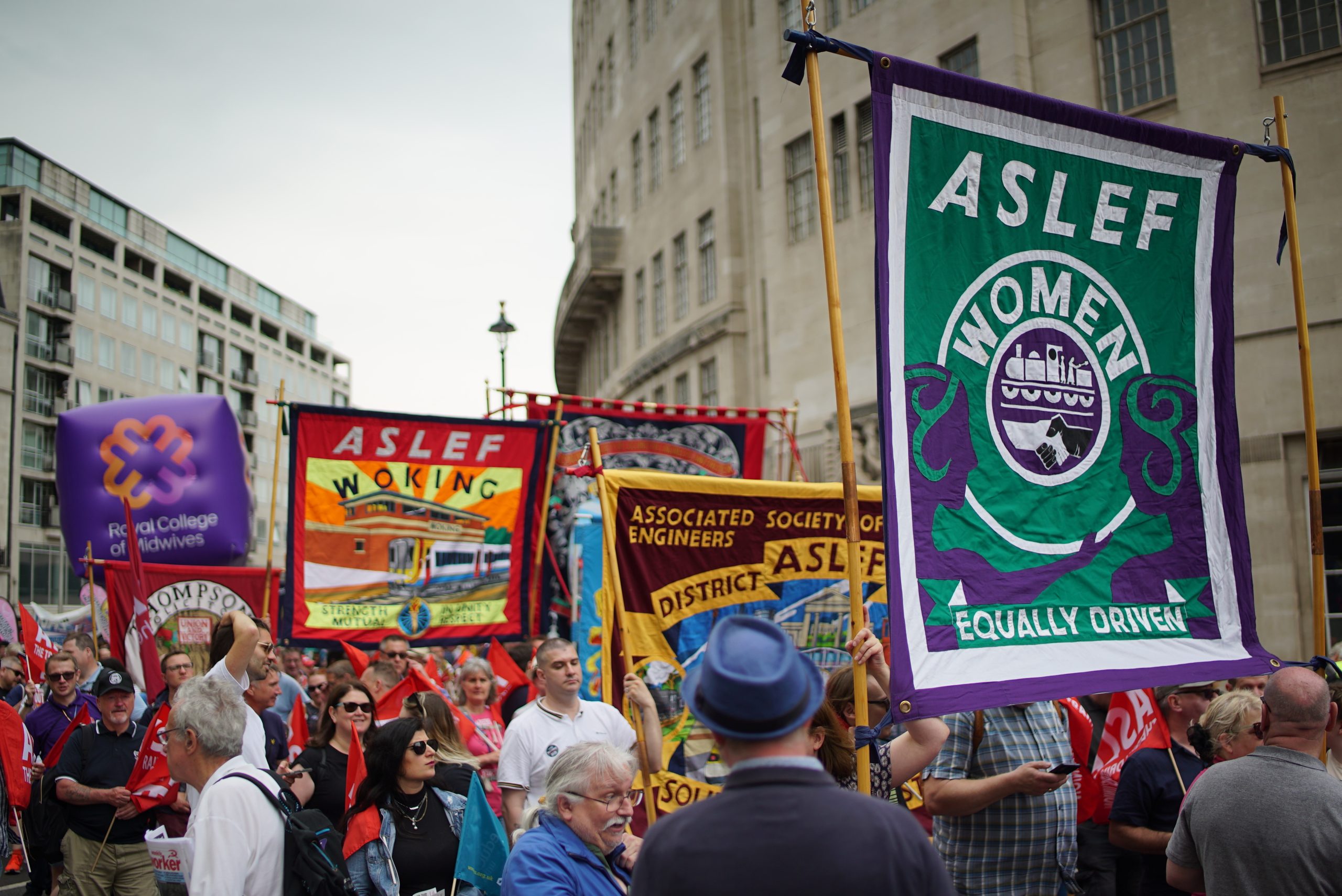Unison service group elections: Time for fighting leadership
Unison Communists
Balloting in the Unison service group executive (SGE) elections takes place from 22 April through to 17 May.
These important elections take place against the background of a crumbling Tory government, a leap in inflation, and the prospect of a right-wing Labour government, which no one (except the trade union leaders) expects will deliver any change.
The public sector faces an unparalleled crisis. To pick just two examples: in local government, councils have barely enough money to cover their statutory duties; in the NHS, meanwhile, there are 40,000 vacancies in nursing alone.
Unison members are constantly being forced to work harder, with fewer and fewer people having to cover more and more work. There are huge gaps in provision. For much of the time, management relies on the good will of members to keep the wheels turning.
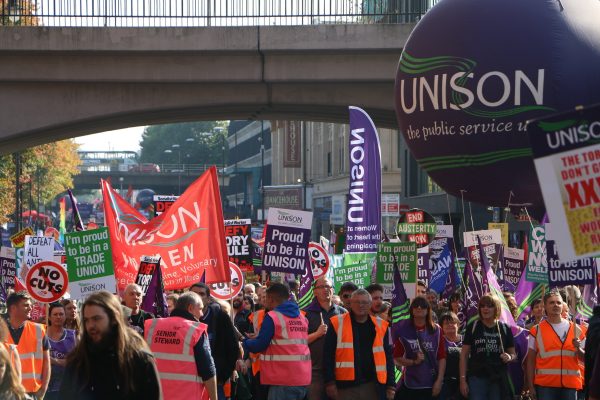
The Unison bureaucracy has consistently sought to avoid conflict with the government over these issues – even as other unions are taking to the field of struggle.
They pride themselves on their ‘pragmatism’. But their conservative approach is leading the union, and the public sector it serves, directly over a cliff.
‘Representatives’
Our union’s political ‘representation’, meanwhile, involves characters such as Wilma Brown, who also serves on the union’s health service executive in Scotland.
Picked to stand as a Labour candidate, the party soon had to withdraw its endorsement of Brown when her questionable social media activity was brought to light. This included likes of racially-charged tweets aimed at SNP First Minister Humza Yousaf.
Unison was ever-so proud of Brown when she first stood. But there’s been no word on whether they feel the same way about her now.
The forthcoming SGE elections are therefore significant. These SGEs make the key decisions on pay campaigns and service conditions across the different parts of the union.
Leadership
Unison needs a fighting leadership at every level: from the NEC, down to every local branch. As such, the Unison Communists are calling for members to vote for the left candidates backed by Time for Real Change (TFRC).
We would, however, urge TFRC to grasp the nettle, in order to advance from the position it finds itself in going into these elections.
The union bureaucracy and the right wing have the weight of the establishment behind them, not to mention an army of 1200 full-timers. To successfully beat this machine, TFRC cannot afford to stick to purely organisational campaigning, but go for the jugular.
This means fighting for a clear socialist programme for Unison, laying out how the union could use its might to smash Tory austerity and bring about real control for public sector employees in the workplace.
This would be a powerful rallying cry for Unison’s long-ignored membership.
With such a bold approach, members would finally see what ‘real change’ actually means – and would be prepared to fight tooth and nail for it.
ASLEF train drivers prepare for further action
Hugh, Oxford
ASLEF train drivers were out on strike across the country for several days in early April, in a long-running struggle over pay, which goes back to 2019. This will be followed by further action between 7-9 May.
A pay offer is on the table. But workers know that this comes with strings attached.
In the words of one ASLEF driver we spoke to: “[This deal] is a poisoned chalice that offers more pay while attacking conditions, eroding sick pay, and taking away our annual leave. Essentially, it isn’t a pay rise, it’s an increase in working hours.”
Alongside job cuts to key roles that have been taking place for years, including to train guards responsible for passenger safety, overwork is a serious problem on the railways.
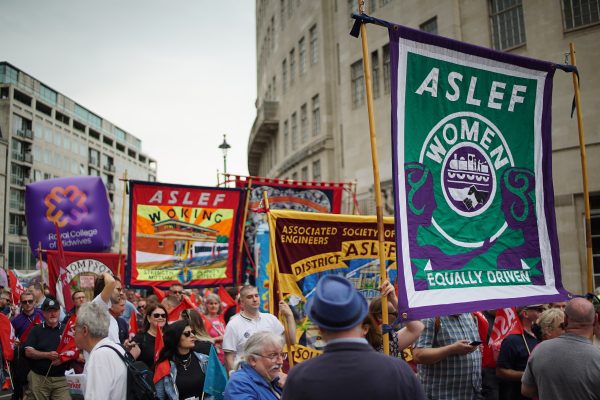
It’s not uncommon to hear how train drivers – many of whom already work in excess of 40 hour weeks – are expected to break themselves in order to earn a pay rise in line with the cost of living.
The effects of current overtime bans highlights the rail companies’ Achilles’ heel. “The importance of overtime to the business models of these companies is massive,” stated one driver. “[So much so] that they often respond by reducing levels of service [when a ban is called].”
Without this extra work, the railways simply grind to a halt – as train companies have effectively been forced to admit, by cancelling services that they can no longer run.
That doesn’t mean negotiations have been productive, however. While drivers battle to maintain their living standards, the fifteen (!) rail companies employing ASLEF workers pass the buck to one another, with the government “bankrolling it all”, in the words of one union member.
As the battles drag on, ASLEF members are aware that the Tories are happy to let this struggle run out until the general election. Then it’ll be Labour’s problem to deal with.
Both train drivers and passengers want the same thing: expanded routes, more trains operating, and better services. But these demands are not on the agenda for the ladies and gentlemen in charge of Britain’s infrastructure. They’re too busy defending genocides and publishing crap memoirs.
It’s time for workers to take charge, and run our railways properly for a change!
Civil servants challenge arms sales
A Cardiff PCS member
The PCS union is currently contemplating legal action to defend its members in the Department for Business and Trade, in the context of Israel’s onslaught on Gaza.
These workers are worried that by carrying out the work of the department, including handling arms export licences to Israel, they may be legally complicit in Netanyahu’s war crimes.
PCS has been demanding to see the legal advice given to Tory ministers, following the International Court of Justice’s preliminary ruling that Israel’s actions may amount to genocide.
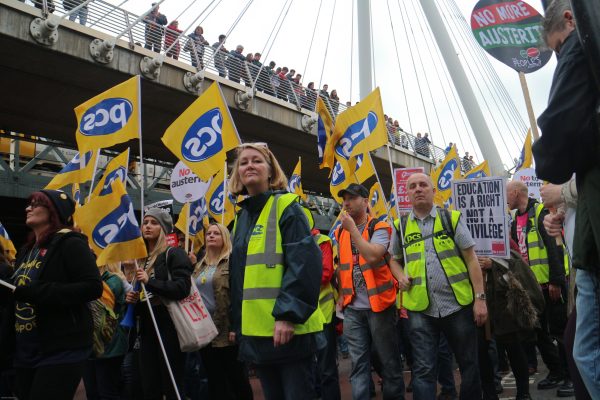
The response is unlikely to fill staff with confidence. The government has stated that “the question of criminal liability for civil servants is very unlikely to arise”, but that further legal advice cannot be shared due to confidentiality.
How can these staff – who can see that the work they are being asked to do is likely supporting atrocities in Palestine – have any trust in government lawyers and ministers?
It’s clear that these same Tory warmongers who have been cheering Israel on since day one are defending their own interests by dragging their feet.
At the same time, trade unionists must be wary of purely legal routes of struggle. A battle in the courts is likely to be an uphill one. And there is no guarantee that judges will side with workers on this issue. At the end of the day, they are part of the same capitalist state that grants arms licences in the first place.
Legal action should be pursued. But PCS should also make use of the mood to utilise other, more militant measures at its disposal – including balloting members for action, if necessary.
If the Tories think they can make PCS members complicit in their crimes, they’re going to get a nasty shock!
Higher education under attack: Kick out the bosses and bureaucrats!
Caleb Sharp, Greenwich UCU (personal capacity)
In light of the recent Tory restrictions on international student visas, senior management at universities across the UK have braced for large cuts in revenue.
As per usual, the bureaucrats in charge of higher education have opted for a strategy of coordinated mass redundancies across the country.
According to the UCU’s website, 51 universities are experiencing “restructuring” programmes, aimed at cutting labour costs, without any relief for the remaining members of staff.
The UCU branch at the University of Kent reports a cut of 100 members of staff. At Goldsmiths University in London, a staggering 132 jobs are set to go.
According to a representative of Goldsmiths UCU, emails warning of redundancies were a carbon copy of those sent to staff at Kent Uni – even bearing the latter’s logo and signature!
This episode not only shows how lazy campus bosses are, but how they coordinate with one another in their efforts to manage higher education on behalf of big business.
In a special UCU solidarity meeting held on 15 April, academic and support staff correctly concluded that the situation goes beyond problems with individual universities or managers.
We all know that this attack needs to be faced down nationally, not just locally. One UCU member voiced what many were thinking when she criticised the union’s leadership, stating: “If our leaders were braver, we’d already have a strategy for national action.”
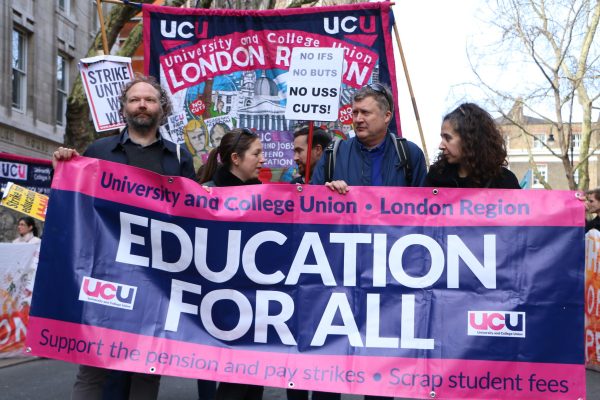
Indeed the betrayals of Jo Grady in the previous national campaign remain fresh in the minds of many union members.
UCU members do not have to fight this battle alone, however. Staff at Kent University mentioned that they have had great support from the student population, many of whom have already pledged to rally in the support of striking workers.
Representatives from Goldsmiths, Aberdeen, and several other universities also rightly recognised the need to win over students, and resolved to raise demands to this end, such as abolishing tuition fees.
The marketisation of education has gutted the sector at every level. From primary to higher education: structures, workers’ rights, and even literal buildings are crumbling.
It’s high time that the people who actually run education were in charge. That’s why the communists call for worker and student control of universities.
Members of the UCU must link with students and sister unions to ‘kick capitalism out of higher education’, through coordinated, national strike action.
Such a strategy, based around a clear socialist programme that takes the commanding heights of the economy into public hands, can end this cultural vandalism for good.
As individuals, we are expendable to the bosses. But as a class, we are essential. We must utilise this potential power, and fight to put workers and students in control of our campuses.
NEU rank and file organise for action
Tommaso Verga, South London NEU (personal capacity)
On 15 April, an online meeting was held with the participation of over 70 districts of the National Education Union (NEU).
Last year, teachers were convinced by union leaders to accept a poorly-funded 6.5% pay increase. This means that further action is necessary.
Far from being demoralised, this meeting showed that rank-and-file NEU members are feeling more positive and militant than at any point in recent history.
The mood was energetic. The contributions focused on a range of subjects, but a debate over strategy is emerging.
One suggestion from several attendees was for reps and local leadership to actively initiate local disputes and campaigns over issues affecting their schools. This shows a healthy desire to build grassroots organisation.
It is also true, however, that this energy has to be channelled at a national level. Local disputes, while often necessary, are not enough to tackle decades of chronic underfunding and cuts.
Nobody expects the next pay offer to be anything less than pathetic. The question, therefore, is whether the union leadership is ready to act accordingly.
We must mobilise the rank and file, and prepare for a serious campaign that links our fight to those of sister unions.
Ultimately, the question must be asked: who is best placed to save education – the people cutting it to the bone, or the people who work tirelessly to keep it running?
One thing is beyond doubt: NEU members are ready to fight. They just need a lead!

